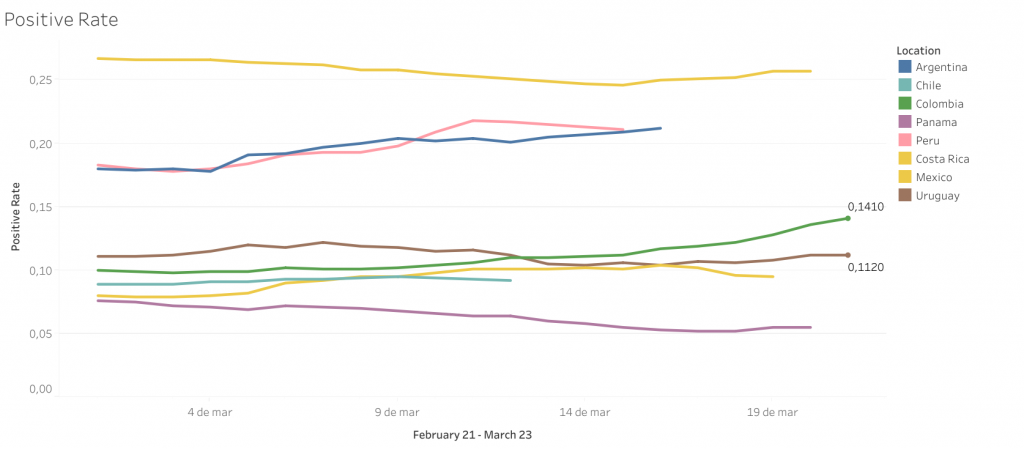What You Should Know
- Women Empowerment: The Inter-American Development Bank, Mastercard, and other private sector actors are joining efforts in the “Women Growing Together in the Americas” initiative. The project encourages women entrepreneurs in Latin America and the Caribbean to integrate their businesses into foreign trade and regional value chains.
- Green Recovery: At the Inter-American Development Bank’s (IDB) annual meeting in Barranquilla, Colombia, policymakers presented roadmaps for a low-carbon economic recovery. The IDB announced creation of a fund to protect the Amazon rainforest, which could receive up to $1 billion in donations, including an initial commitment of $20 million from the Bank.
- Colombia: Following an economic contraction of 6.8 percent in 2020, “we already have the plan, the vision, the investment, and the cycles of investment that will lead us to grow close [to] or above 5 percent this year,” President Iván Duque said on March 25 during an Atlantic Council Front Page event with US Senators Cardin and Blunt.
- 9: For the ninth week in a row, Mexican health authorities have reported a decrease in active COVID-19 cases.
Health + Innovation
- El Salvador: The country received the first shipment of COVID-19 vaccine doses allotted through the COVAX facility. El Salvador will continue to receive COVAX shipments until the country vaccinates 20 percent of its 6.4 million population.
- Brazil: On March 28, Brazil will receive 1,022,400 COVID-19 vaccine doses through the COVAX mechanism. More doses are expected to arrive throughout the year.
- Chile: On March 20, Chile reported its highest daily count of new COVID-19 cases since the start of the pandemic, despite widespread restrictions and progress on vaccination. The government attributed the rise in cases to peak summer vacation activity. The Health Ministry asked people to remain cautious since herd immunity will not be met until 80 percent of the population is vaccinated, which is likely to occur by end of June.
- Fake Vaccines: Mexican authorities seized 5,700 doses of alleged Sputnik V vaccines that the Russian government deemed as fake. The doses were seized aboard a private plane en route to Honduras.
- Vaccine Diplomacy: Taiwan will help its sole diplomatic ally in South America, Paraguay, buy COVID-19 vaccines, on the condition they are not Chinese ones. Taiwan’s domestically developed vaccine is not expected to roll out until the middle of the year at the earliest.
Economies in Focus
Multilateral Analysis
- The Pew Research Center found that 54 million people fell out of the middle class in 2020.This is the first time the middle class has shrunk since 1990.
- The IMF said that while Colombia had been hard hit by the pandemic, the country’s policy response had been timely and well-coordinated; it highlighted the country’s projected gradual recovery in 2021.
- After concluding the Article IV consultation with Peru, the IMF reported that the country’s outlook is highly uncertain and that second wave of COVID-19 cases is likely to dampen the economic recovery.
Economic Relief
- Chilean President Sebastián Piñera announced $6 billion in emergency spending measures. The funds will be used to extend aid for families living under lockdowns, introduce new job subsidies, and increase unemployment insurance, among other measures.
- Uruguay will increase financial assistance provided to nearly two million Uruguayans and also re-impose a special tax on high-earning public officials for the next two months.
Economic Impact
- Mexican business association Consejo Coordinador Empresarial (CCE) called upon citizens to uphold sanitary measures during Semana Santa, emphasizing that a third wave of cases could cause sales to dramatically fall and another confinement could yield more bankruptcies.
- Argentina’s economy contracted by 9.9 percent in 2020, the biggest contraction in twenty years, according to the national statistics institute.
Quarantines + Travel Restrictions
Quarantines + Reopenings
- The Colombian Government announced that it would impose curfews and restrictions on movement based on identity cards in cities where ICU capacities have reached 70 percent occupancy. Restrictions are already in place in Santa Marta, Medellín, and Barranquilla.
- On March 25, more than 13 million people in Chile re-entered quarantine, despite the country’s largely successful vaccination campaign. In total, 42 districts, including 21 in the Santiago Metropolitan Area, will return to total lockdown.
- Paraguay is likely to re-enter lockdown as hospitals struggle to deal with an increase of COVID-19 patients. Health Minister Julio Borba said that the new measures could begin as early as March 27.
- Uruguayan President Luis Lacalle Pou announced that public offices would be closed and in-person classes would be completely suspended, as Uruguay experiences its worst outbreak yet.
Border and travel restrictions
- Argentina will reduce international flights and strengthen border controls with neighboring countries, particularly Brazil, Paraguay, and Bolivia. The national government also called upon provincial leaders to ensure returning Argentines comply with the nationally mandated quarantine measures.
In Focus: Venezuela Reaches Agreement to Purchase COVID-19 Vaccines
- The Venezuelan regime and the opposition have reached an agreement to purchase and distribute COVID-19 vaccines through the COVAX mechanism. Under the agreement, the opposition – recognized as the legitimate government by the United States – will request permission from the U.S. Treasury Department’s Office of Foreign Assets Control to access frozen funds to purchase COVID-19 vaccines. The US has frozen $342 million of Venezuelan government assets as part of sanctions aimed at ousting the Maduro regime.
- The agreement authorizes up to $30.3 million to pay for COVAX vaccines and cold chain technology. COVAX has reserved between 1.4 and 2.4 million vaccine doses for Venezuela, should it be able to pay for them. However, the Maduro regime said it would not authorize the AstraZeneca vaccine – the main vaccine used by COVAX – due to its “effects on patients.”
- Venezuela has received 200,000 vaccine doses from Russia and 500,000 from China.
By the numbers
- Cases by country: Brazil (12,136,615) #2 worldwide, Colombia (2,347,224) #11 worldwide, Argentina (2,261,557) #12 worldwide, Mexico (2,203,041) #13 worldwide, Peru (1,481,259) #19 worldwide, Chile (947,783) #22 worldwide, Panama (351,667) #44 worldwide, Ecuador (316,807) #46 worldwide, Bolivia (266,086) #51 worldwide, Dominican Republic (250,579) #53 worldwide, Source: worldometers.info
- Prevalence rate (total cases per million people): Aruba (83,122) #10 worldwide, Panama (80,587) #11 worldwide, Brazil (56,078) #40 worldwide, Argentina (49,274) #48 worldwide, Chile (49,274) #49 worldwide, Colombia (45,777) #54 worldwide, Peru (44,359) #58 worldwide, Costa Rica (41,624) #62 worldwide, Curaçao (37,514) #66 worldwide, Belize (30,807) #73 worldwide, Source: worldometers.info
- Deaths per capita (deaths per million people): Mexico (1,532) #17 worldwide, Peru (1,516) #18 worldwide, Brazil (1,399) #23 worldwide, Panama (1,389) #24 worldwide, Colombia (1,215) #28 worldwide, Argentina (1,205) #29 worldwide, Chile (1,165) #32 worldwide, Bolivia (1,026) #36 worldwide, Ecuador (927) #41 worldwide, Belize (784) #47 worldwide, Source: worldometers.info
Quick take


